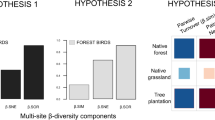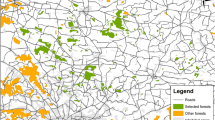Abstract
Morning is the ideal period for sampling bird communities in tropical forests, but there is a vocal decline in birds over time. We investigate the variation in species richness and composition between six morning periods in a tropical rainforest in Brazil and the implication of this decline on the adaptability of the point count method. The study aimed to optimize the point count method, evaluating how many points are needed to obtain satisfactory species richness and composition data. The results showed that the first four periods of 15 min after sunrise are the most effective as they cover more than 96% of total species richness, with a peak in species richness in the second and third periods. However, taxonomic composition showed an average beta diversity of 28.1% among the morning periods, with turnover dominating over nestedness. The later morning periods added only a small number of new species, with some species having associations with specific time periods. Thus, the most important sampling range for ornithologists interested in species richness is the first four periods, corresponding to a total duration of 1 h and 45 min after sunrise. However, a researcher interested to investigate species composition, where habitat species composition is desired or the recording of specific species, a longer stay in the field is indicated, because the longer the time spent in the field, the greater the chances of recording locally rare species.





Similar content being viewed by others
References
Antunes AZ (2008) Diurnal and seasonal variability in bird counts in a forest fragment in southeastern Brazil. Rev Bras Zool 25:228–237. https://doi.org/10.1590/S0101-81752008000200011
Baselga A (2010) Partitioning the turnover and nestedness components of beta diversity. Glob Ecol Biogeogr 19:134–143. https://doi.org/10.1111/j.1466-8238.2009.00490.x
Baselga A, Orme CDL (2012) betapart: an R package for the study of beta diversity. Methods Ecol Evol 3:808–812. https://doi.org/10.1111/j.2041-210X.2012.00224.x
Basile M (2022) Rare species disproportionally contribute to functional diversity in managed forests. Sci Rep 12:5897. https://doi.org/10.1038/s41598-022-09624-9
Berriozabal-Islas C, Badillo-Saldaña LM, Ramírez-Bautista A, Moreno CE (2017) Effects of habitat disturbance on lizard functional diversity in a tropical dry forest of the Pacific Coast of Mexico. Trop Conserv Sci 10:1–11. https://doi.org/10.1177/1940082917704972
Bibby C, Jones M, Stuart M (1998) Expedition field techniques: bird surveys. Expedition Advisory Centre, London, UK
Blake JG (1992) Temporal variation in point counts of birds in a lowland wet forest in Costa Rica. Condor 94:265–275. https://doi.org/10.2307/1368816
Cardoso P, Pekár S, Jocqué R, Coddington JA (2011) Global patterns of guild composition and functional diversity of spiders. PLoS ONE 6:e21710. https://doi.org/10.1371/journal.pone.0021710
Cavarzere V, Moraes GP, Roper JJ, Silveira LF, Donatelli RJ (2013) Recommendations for monitoring avian populations with point counts: a case study in southeastern Brazil. Pap Avulsos Zool 53:439–449. https://doi.org/10.1590/S0031-10492013003200001
Chao A (1984) Nonparametric estimation of the number of classes in a population. Scand J Stat 11:265–270
Chao A, Gotelli NJ, Hsieh TC, Sander EL, Ma KH, Colwell RK, Ellison AM (2014) Rarefaction and extrapolation with Hill numbers: a framework for sampling and estimation in species diversity studies. Ecol Monogr 84:45–67. https://doi.org/10.1890/13-0133.1
Chao A, Kubota Y, Zelený D, Chiu C-H, Li C-F, Kusumoto B, Yasuhara M, Thorn S, Wei C-L, Costello MJ, Colwell RK (2020) Quantifying sample completeness and comparing diversities among assemblages. Ecol Res 35:292–314. https://doi.org/10.1111/1440-1703.12102
Costa LA, Gusmão LFP (2016) Communities of saprobic fungi on leaf litter of Vismia guianensis in remnants of the Brazilian Atlantic Forest. J For Res 28:163–172. https://doi.org/10.1007/s11676-016-0268-4
de Araújo CB, Jardim M, Saturnino NSF, Rosa GM, Lima MR, dos Anjos L (2020) The optimal listening period for an effective assessment of bird richness and composition: a case study of Neotropical forest. J Ornithol 162:303–306. https://doi.org/10.1007/s10336-020-01812-6
Diefenbach DR, Brauning DW, Mattice JA (2003) Variability in grassland bird counts related to observer differences and species detection rates. Auk 120:1168–1179. https://doi.org/10.1093/auk/120.4.1168
Ding Z, Feeley KJ, Wang Y, Pakeman RJ, Ding P (2013) Patterns of bird functional diversity on land-bridge island fragments. J Anim Ecol 82:781–790. https://doi.org/10.1111/1365-2656.12046
dos Anjos L (2007) A eficiência do método de amostragem por pontos de escuta na avaliação da riqueza de aves. Rev Bras Ornitol 15:239–243
dos Anjos L, Oliveira HS, Willrich G, Jardim M, Rosa GLM, de Araújo CB (2022) Atlantic Forest birds are more functionally and taxonomically diverse in valley bottoms relative to uplands. Acta Oecol 115:103829. https://doi.org/10.1016/j.actao.2022.103829
dos Anjos L, Urbano MR, Oliveira HS, Natti PL (2023) The functional importance of rare and dominant species in a Neotropical forest bird community. J Nat Conserv 72:126361. https://doi.org/10.1016/j.jnc.2023.126361
Gardner TA, Barlow J, Araujo IS, Ávila‐Pires TC, Bonaldo AB, Costa JE, Esposito MC, Ferreira LV, Hawes J, Hernandez MI, Hoogmoed MS (2008) The cost-effectiveness of biodiversity surveys in tropical forests. Ecol Lett 11:139–150. https://doi.org/10.1111/j.1461-0248.2007.01133.x
Howe HF (1977) Bird activity and seed dispersal of a tropical wet forest tree. Ecology 58:539–550. https://doi.org/10.2307/1939003
Hsieh TC, Ma KH, Chao A (2016) iNEXT: an R package for rarefaction and extrapolation of species diversity (Hill numbers). Methods Ecol Evol 7:1451–1456. https://doi.org/10.1111/2041-210X.12613
Karplus M (1952) Bird activity in the continuous daylight of Arctic summer. Ecology 33:129–134. https://doi.org/10.2307/1931264
Kronenberg J (2014) Environmental impacts of the use of ecosystem services: case study of birdwatching. Environ Manage 54:617–630. https://doi.org/10.1007/s00267-014-0317-8
Leitão RP, Zuanon J, Villéger S, Williams SE, Baraloto C, Fortunel C, Mendonça FP, Mouillot D (2016) Rare species contribute disproportionately to the functional structure of species assemblages. Proc R Soc Lond B Biol Sci 283:20160084. https://doi.org/10.1098/rspb.2016.0084
Mallet-Rodrigues F, Noronha MLM (2003) Variação na taxa de captura de passeriformes em um trecho de mata atlântica de encosta, no sudeste do Brasil. Ararajuba 11:111–118
Methorst J, Bonn A, Marselle M, Böhning-Gaese K, Rehdanz K (2021a) Species richness is positively related to mental health – a study for Germany. Landsc Urban Plan 211:104084. https://doi.org/10.1016/j.landurbplan.2021.104084
Methorst J, Rehdanz K, Mueller T, Hansjürgens B, Bonn A, Böhning-Gaese K (2021b) The importance of species diversity for human well-being in Europe. Ecol Econ 181:106917. https://doi.org/10.1016/j.ecolecon.2020.106917
Oksanen J, Blanchet FG, Friendly M, Kindt R, Legendre P, McGlinn D, Minchin PR, O’Hara RB, Simpson G, Solymos P, Stevenes MHH, Szoecs E, Wagner H (2020) Vegan: community ecology package. R package version, vol 2, pp 5–7. https://CRAN.R-project.org/package=vegan. Accessed 12 Jun 2022
Oliveira HS (2021) Bird trophic guilds in distinct phytophysiognomies associated with the Atlantic forest in the Ibura National Forest, Northeastern Brazil. Gaia Scientia 15:37–55. https://doi.org/10.22478/ufpb.1981-1268.2021v15n1.51120
Oliveira HS, dos Anjos L (2022) Silent changes in functionally stable bird communities of a large protected tropical forest monitored over 10 years. Biol Conserv 265:109407. https://doi.org/10.1016/j.biocon.2021.109407
Oliveira HS, dos Anjos L (2023) Reduced vegetation integrity in selectively logged Atlantic rainforest affects bird diversity: higher taxonomic and functional diversity, but increased niche overlap. J Nat Conserv 73:126399. https://doi.org/10.1016/j.jnc.2023.126399
Oliveira HS, Gouveia SF, Ruiz-Esparza J, Ferrari SF (2020) Fragment size and the disassembling of local bird communities in the Atlantic Forest: a taxonomic and functional approach. Perspect Ecol Conserv 18:304–312. https://doi.org/10.1016/j.pecon.2020.09.003
Oliveira HS, Pedroso MA, Santos JW, Pereira AS, Ruiz-Esparza J, Rocha PA, Beltrão-Mendes R, Ferrari SF (2018) Using MacKinnon lists and mist-netting simultaneously: maximizing the efficiency of rapid surveys of bird populations in the Atlantic Forest of northeastern Brazil. Rev Bras Ornitol 26:105–115. https://doi.org/10.1007/BF03544421
Pacheco JF, Silveira LF, Aleixo A, Agne CE, Bencke GA, Bravo GA, Brito GR, Cohn-Haft M, Maurício GN, Naka LN, Olmos F (2021) Annotated checklist of the birds of Brazil by the Brazilian Ornithological Records Committee - second edition. Ornithol Res 29:94–105. https://doi.org/10.1007/s43388-021-00058-x
Pedroza D, Verde RS, Guilherme E (2019) Birds and bats captured in a managed forest in Southwestern Brazilian Amazonia: results and recommendations from a short-term study. Braz J Biol Sci 6:283–295. https://doi.org/10.21472/bjbs.061226
R Core Team (2022) A language and environment for statistical computing. 4.2.0 ed. R Foundation for Statistical Computing, Vienna
Robbins CS (1981a) Bird activity levels related to weather. Stud Avian Biol 6:301–310
Robbins CS (1981b) Effect of time of day on bird activity. Stud Avian Biol 6:157–186
Roos AL, Giehl ELH, Hernández MIM (2020) Local species turnover increases regional bird diversity in mangroves. Austral Ecol 46:204–217. https://doi.org/10.1111/aec.12969
Rosenzweig ML (1995) Species diversity in space and time. Cambridge University Press, Cambridge
Roswell M, Dushoff J, Winfree R (2021) A conceptual guide to measuring species diversity. Oikos 130:321–338. https://doi.org/10.1111/oik.07202
Si X, Cadotte MW, Zeng D, Baselga A, Zhao Y, Li J, Wu Y, Wang S, Ding P (2017) Functional and phylogenetic structure of island bird communities. J Anim Ecol 86:532–542. https://doi.org/10.1111/1365-2656.12650
Signorell A et al (2023) DescTools: tools for descriptive statistics. R package version, p 49. https://CRAN.R-project.org/package=DescTools. Accessed 12 Jun 2022
Simons TR, Alldredge MW, Pollock KH, Wettroth JM (2007) Experimental analysis of the auditory detection process on avian point counts. Auk 124:986–999. https://doi.org/10.1093/auk/124.3.986
Song X, Holt RD, Si X, Christman MC, Ding P (2018) When the species–time–area relationship meets island biogeography: diversity patterns of avian communities over time and space in a subtropical archipelago. J Biogeogr 45:664–675. https://doi.org/10.1111/jbi.13146
Souza RF, Machado SA, Galvão F, Figueiredo-Filho A (2017) Fitossociologia da vegetação arbórea do Parque Nacional do Iguaçu. Ciência Florestal 27:853–869
Thompson WL (2002) Towards reliable bird surveys: accounting for individuals present but not detected. Auk 119:18–25. https://doi.org/10.1642/0004-8038(2002)119[0018:TRBSAF]2.0.CO;2
Tinoco BA, Santillán VE, Graham CH (2018) Land use change has stronger effects on functional diversity than taxonomic diversity in tropical Andean hummingbirds. Ecol Evol 8:3478–3490. https://doi.org/10.1002/ece3.3813
Vielliard JME, Almeida MEC, dos Anjos L, Silva WR (2010) Levantamento quantitativo por pontos de escuta e o Índice Pontual de Abundância (IPA). In: Matter SV, Straube FC, Accordi I, Piacentini V, Cândido-Jr JF (eds) Ornitologia e Conservação: ciência aplicada, técnicas de pesquisa e levantamento. Technical Books, Rio de Janeiro, pp 47–60
Vielliard JME, Silva WR (1990) Nova metodologia de levantamento quantitativo e primeiros resultados no interior de São Paulo. IV Encontro Nacional dos Anilhadores de Aves. S. Mendes, Recife
Volpato GH, Lopes EV, Mendonça LB, Boçon R, Bisheimer MV, Serafini PP, dos Anjos L (2009) The use of the point count method for bird survey in the Atlantic forest. Zoologia 26:74–78. https://doi.org/10.1590/S1984-46702009000100012
Whitman AA, Hagan JM III, Brokaw NVL (1997) A comparison of two bird survey techniques used in a Subtropical Forest. Condor 99:955–965. https://doi.org/10.2307/1370146
Whittaker RH (1960) Vegetation of the Siskiyou Mountains, Oregon and California. Ecol Monogr 30:279–338. https://doi.org/10.2307/1943563
Zar JH (2010) Biostatistical analysis. Pearson Prentice Hall, New Jersey
Acknowledgements
We thank the Instituto Chico Mendes de Conservação da Biodiversidade (ICMBio, Brasilia) for giving us permission (24483) to study birds in the Iguaçu National Park, where we were assisted by A.N.S.R.
Funding
This study was financed in part by the Coordenação de Aperfeiçoamento de Pessoal de Nível Superior — Brasil (CAPES) — Finance Code 001. L. dos Anjos receives a grant from CNPq (Conselho Nacional de Desenvolvimento Científico e Tecnológico, Brasilia, 308523/2021-0).
Author information
Authors and Affiliations
Contributions
H.S. Oliveira and L. dos Anjos conceived the ideas of the paper. L. dos Anjos collected the data in the field. H.S. Oliveira and I.A. Barreto led the writing of the manuscript and conducted analyses. All authors contributed to writing the present paper and gave their final approval for submission.
Corresponding author
Ethics declarations
Ethics approval
None.
Consent to participate
All the authors consent to participate in this study.
Consent for publication
All the authors consent to publish this study.
Conflict of interest
The authors declare no competing interests.
Additional information
Communicated by Marcos Santos (Associated Editor)
Supplementary information
Rights and permissions
Springer Nature or its licensor (e.g. a society or other partner) holds exclusive rights to this article under a publishing agreement with the author(s) or other rightsholder(s); author self-archiving of the accepted manuscript version of this article is solely governed by the terms of such publishing agreement and applicable law.
About this article
Cite this article
Oliveira, H.S., Barreto, I.A. & dos Anjos, L. Temporal beta diversity of bird species using the point count method indicates predominance of turnover over nestedness in an Atlantic Forest site. Ornithol. Res. 31, 265–273 (2023). https://doi.org/10.1007/s43388-023-00147-z
Received:
Revised:
Accepted:
Published:
Issue Date:
DOI: https://doi.org/10.1007/s43388-023-00147-z




